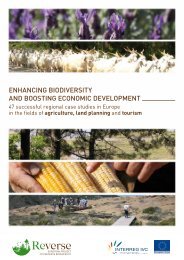agriculture - Reverse, European Project to Preserve Biodiversity
agriculture - Reverse, European Project to Preserve Biodiversity
agriculture - Reverse, European Project to Preserve Biodiversity
You also want an ePaper? Increase the reach of your titles
YUMPU automatically turns print PDFs into web optimized ePapers that Google loves.
At the moment, the position of stakeholders working on the dynamic conservation of biodiversity is drastically<br />
different from this position. On 24 February 2011, the 7th anniversary of the <strong>European</strong> signature of the ITPGRFA,<br />
farmers and farming sec<strong>to</strong>r professionals from 17 <strong>European</strong> countries met in Szeged, Hungary, and prepared<br />
a statement <strong>to</strong> be addressed <strong>to</strong> <strong>European</strong> governments, the <strong>European</strong> Union and the Governing Body of the<br />
International Treaty on Plant Genetic Resources for Food and Agriculture. This statement was prepared one<br />
month before the Bali ITPGRFA meeting in March 2011, and asked for the right:<br />
- <strong>to</strong> choose freely, select, develop and grow their own seeds (except for GMOs) and then <strong>to</strong> sell the crops,<br />
irrespective of whether they come from varieties listed in the catalogue or not;<br />
- <strong>to</strong> be granted free access <strong>to</strong> plant genetic resources in ex situ seed banks;<br />
- <strong>to</strong> exchange and sell seeds for conservation purposes and for the dynamic management or selection<br />
on the farm used for agricultural production. In this respect, we demand explicit recognition of farmers’<br />
rights <strong>to</strong> select and conserve their own seeds and, for this reason, <strong>to</strong> exchange plant genetic resources of<br />
varieties not listed in the catalogue, as breeders are doing;<br />
- <strong>to</strong> reproduce their own seeds in order <strong>to</strong> adapt them <strong>to</strong> local conditions. An explicit recognition of the<br />
right <strong>to</strong> use freely, and without need for a license, is needed for all varieties, regardless whether or not the<br />
varieties are protected by industrial property rights, in order <strong>to</strong> be able <strong>to</strong> develop new varieties;<br />
- <strong>to</strong> protect their seeds from genetic contamination and appropriation through contamination by patented genes.<br />
(Declaration of Szeged, 2011, http://www.liberate-diversity-hungary2011.org/) ]<br />
8 th RECOMMENDATION<br />
PROMOTE DYNAMIC ON-FARM CONSERVATION OF GENETIC RESOURCES, APPLYING PROTOCOLS OF<br />
PARTICIPATORY PLANT BREEDING<br />
Low-input <strong>agriculture</strong>, especially in certain contexts such as marginal areas, requires greater biodiversity <strong>to</strong> be<br />
included in the farming system. Notably, there is a lack of varieties suited <strong>to</strong> the specific needs of organic <strong>agriculture</strong>.<br />
The principles of Participa<strong>to</strong>ry Plant Breeding (28) suggest a pattern of action that would allow the management of<br />
biodiversity available both inside and outside of the region, <strong>to</strong> select or create suitable varieties for such specific<br />
needs, thus increasing the level of biodiversity present in the system.<br />
ACTION PLAN<br />
Provide incentives for the dynamic management of genetic resources, funding projects essaying participative<br />
pro<strong>to</strong>cols of characterization, evaluation, multiplication and breeding of different kind of materials, in order<br />
<strong>to</strong> obtain varieties suited <strong>to</strong> low-input <strong>agriculture</strong> and <strong>to</strong> specific agro-environmental contexts.<br />
Provide incentives for the experimental construction of networks of exchange and seed banks managed by<br />
communities of farmers, where both local and newly created varieties are maintained on-farm.<br />
Promote stable cooperation between research institutes and farmers involved in the protection/management<br />
of biodiversity.<br />
Promote the dissemination of knowledge related <strong>to</strong> the peculiarities and use of such resources, providing<br />
incentives for training, the creation of networks, and the organization of meetings, conferences and publications.<br />
Support the characterisation of technical, nutritional, organoleptic, and social interests of these new genetic<br />
resources <strong>to</strong> allow their promotion among agricultural stakeholders, and final consumers.<br />
(28) Participa<strong>to</strong>ry Plant Breeding (PPB) is an experimental model of selection and breeding where the diversity in the agricultural system is managed<br />
through a continuous cooperation between researchers and farmers in the field, in order <strong>to</strong> develop varieties that really meet their specific needs. The<br />
involvement of the farmers consists in the conduction of tests (often performed in their own fields), observation, assessment and selection activities,<br />
and it also includes an extensive use of local germplasm s<strong>to</strong>red in banks or maintained in the rural communities. Using this approach, farmers’ and<br />
scientific researchers’ knowledge is used within the breeding programme in the same way and decisions are made jointly. The challenge of the PPB<br />
is <strong>to</strong> link the increase in productivity and food security not only <strong>to</strong> agrobiodiversity conservation but also <strong>to</strong> the increase of agrobiodiversity in the<br />
production process. PPB-based projects have only recently been activated in the EU (www.solibam.eu/), essentially targeting low-input and organic<br />
<strong>agriculture</strong>. See Ceccarelli and Grando, 2009.<br />
EUROPEAN AGRICULTURE AND BIODIVERSITY CHARTER<br />
CHALLENGE 2<br />
33



